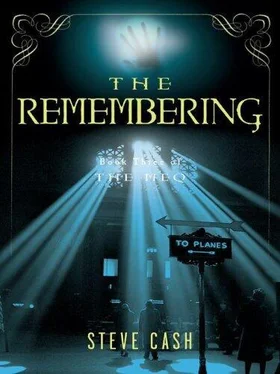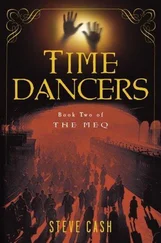“I don’t know,” I said, “I mean … I’m not sure.” It was a stupid answer, yet it was true.
As quickly and quietly as we could, we covered the distance to the gatehouse and gate, which was locked. I paused long enough to look inside the gatehouse. It was empty. Within the last five days, someone had removed the body of Shutratek. Just then something made me turn and look back at the shiro . For a split second, in an open window on the highest tier of the stone tower, I thought I saw two green eyes staring down at me, but they disappeared instantly. Susheela the Ninth was already over the gate and waiting for me on the other side. Could it have been the Fleur-du-Mal? Had he been watching us from the beginning? Was he letting us escape?
“Why do you hesitate, Z?” she asked. “We must make haste.”
“Sorry,” I said, shaking my head once and tossing Goya to her. I scrambled up and over the gate. In another minute, the shiro was out of sight and we were on our way out of the hills and down to Nagasaki.
We ran, walked, and ran some more. I had no certain destination in mind, but unconsciously I was heading toward the railway and Urakami Station. Even in the hills, we passed many people, some with nothing, some with their meager belongings piled on a wagon or cart. Whether young or old, man or woman, their faces and expressions were devoid of all feeling and life. None of them paid any attention to us. We were invisible to them. They were living and walking, yet their eyes were dead. I kept thinking of Opari to keep from thinking about Sailor and Sak. I could not imagine the kind of unspeakable mass destruction and death these pitiful people had witnessed. I knew many were also dying from radiation as they walked, and for those who lived on and survived, even into old age, life would never be the same.
At one point, we paused to rest in a small open-air shrine by the side of the road. We sat on one of two stone benches inside. Below us, the morning fog blanketing Nagasaki and the Urakami Valley began to slowly burn off and dissipate.
Susheela the Ninth turned to me. “Who is this one you think of repeatedly, Z?”
Her question startled me. “What? How did you know what I was thinking? I never said a word.”
“It was unnecessary. Your heart and mind were shouting.”
I stared at her with brand-new wonder and respect. As far as I knew, this was an “ability” no other Meq had ever possessed. “Is it mental telepathy? Is that what you did?”
“Not quite; however, it is an ancient trait common to my tribe. Another form of communication, if you will — older, simpler. The trait has been a great aid in my survival.”
I looked long into the emerald green eyes of Susheela the Ninth, once again amazed at how little I truly knew or understood about the Meq. I cleared my throat and said, “Opari. Her name is Opari … she is my Ameq.”
“I see.” She paused and glanced away, then smiled to herself. “Opari,” she said slowly, one syllable at a time. “A beautiful name. I believe it means gift in the Basque tongue. Correct?”
“Yes.”
“Where is Opari now? I do not suspect she is near.”
“No, she’s nowhere near, and I give thanks for that. As far as I know, before the bomb, she was still somewhere in China.”
Susheela the Ninth dropped her smile. “Bomb? To what bomb are you referring?”
I looked out over the thinning fog. Spreading out below us, the Urakami Valley or what was left of it was gradually becoming visible, and it was worse than I imagined. “He didn’t tell you? The Fleur-du-Mal didn’t tell you what happened five days ago in Nagasaki?”
“No. Xanti never speaks of the Japanese war. He only speaks of Mahler, and painting, and the Sixth Stone, of course. Now, what do you mean, Z—‘before the bomb’?”
The fog had almost cleared. From our angle in the hills, it now appeared that all of Nagasaki had been annihilated, leaving nothing but a sprawling black scar, a dead zone of vast proportions. “Look there, Sheela,” I said, “look down there and try to conceive of a bomb causing that devastation in a split second, a single bomb with the power of a thousand suns. Eight days ago, the Americans dropped the first one over Hiroshima. Five days ago, they dropped another one on Nagasaki.” A few moments passed. “I knew someone … someone who was in Nagasaki.”
“Yes, I know,” she said.
“You know? How could you possibly know that?”
“Never mind,” she said. “What do they call this bomb?”
“An atom bomb … they call it the atom bomb.”
She gazed out and down at the nightmare of Nagasaki in the distance, then rose to her feet without changing expression. “Take us down there, Z.”
For the next forty-five minutes, Susheela the Ninth and I did not speak, not to each other or to anyone else. Nor will I speak of it now. I will not desecrate the countless missing souls of that place, or the burned and broken bodies and vacant stares of the survivors. We walked among and through a true hell on earth. Without realizing it, I dropped Goya’s skull somewhere along the way. Even if I tried, there are no adequate words for what we saw, and it must never happen again.
Incredibly, the Urakami Station was open and trains were running. No plant, tree, or structure anywhere near the station had survived. I looked up and the giant statue of Shofukuji was gone forever. The stench of death was ever present all the way to the entrance. Suddenly, in my mind I had a “vision” of the Fleur-du-Mal. He was sitting in his kitchen with Koki, polishing various pieces of ancient copper kitchenware and listening to Mahler’s Symphony No. 1, and he was grinning. His perfect white teeth sparkled. I blinked several times, then cleared my eyes and continued walking. Not twenty feet away, the bloated carcass of a dead horse was the last thing I saw as we entered the station.
Once we were inside, Susheela the Ninth seemed to slow down and lag behind. I thought nothing of it and walked ahead five or six paces, then just as suddenly as the “vision” had come, I felt an extremely strong presence jolt my mind and body like a live current. The presence was Meq and very familiar. I never thought I would feel his presence again, or see him again, but this one had surprised and amazed me many times over. I turned the corner and there he was. He stood with arms crossed, leaning casually against the tiled wall, waiting. He wore a cone-shaped straw hat pulled down low on his forehead. When I approached, he pushed the hat up slowly and shook his head from side to side, as if he were slightly annoyed with me. It was Sailor.
“You are late,” he said.
“I am?”
“Yes — we must hurry. The train to Kobe and Osaka leaves in less than five minutes.”
Susheela the Ninth walked up silently beside me. Even though she was a black girl in black pajamas, people passing by paid no attention to her or to us. Nagasaki was too grim and surreal for us to be noticed. I gazed into Sailor’s eyes. He had never looked so good, and his “ghost eye,” which ever since the death of his Ameq, Deza, had been a gray, swirling cloud was now absolutely clear. “I thought you were—”
“Dead?” he finished.
“Yes. How in the world—”
“I will explain later,” he said, then glanced at Susheela the Ninth for the first time. “Now we must move, and move quickly.”
“Sak?” I asked.
Sailor shook his head back and forth once.
“But—”
“I am somewhat like the cockroach, Zianno. I shall survive, regardless of the circumstances.”
My mouth dropped open. “You know the Cockroach? ”
Sailor gave me a quizzical look, then shook his head and led the three of us away toward the trains, talking about a merchant in Osaka as he walked. He reached for Susheela the Ninth’s hand and she gave it to him without hesitation. Somehow, I knew he had been expecting her. As we were buying our tickets, Sailor turned to me and whispered, “No, I do not know the Cockroach . The only cockroach with which I am familiar is an insect, and to the best of my knowledge, unable to speak.” He paused for a heartbeat. “Do you happen to know a cockroach that speaks, Zianno?”
Читать дальше












